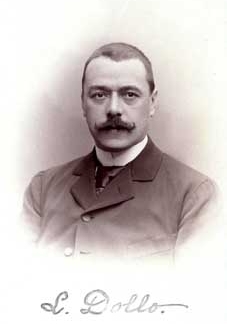Louis Dollo facts for kids
Quick facts for kids
Louis Dollo
|
|
|---|---|

Louis Dollo
|
|
| Born | 7 December 1857 |
| Died | 19 April 1931 (aged 73) |
| Nationality | Belgian |
| Citizenship | French |
| Known for | Dollo's law |
| Awards | Murchison Medal (1912) |
| Scientific career | |
| Fields | palaeontology |
Louis Antoine Marie Joseph Dollo (born in Lille, France, on December 7, 1857 – died in Brussels, Belgium, on April 19, 1931) was a Belgian palaeontologist. He was famous for his important work studying dinosaurs.
Dollo also came up with an idea about how evolution works. This idea is known as Dollo's law. He believed that evolution cannot be reversed. Along with an Austrian scientist named Othenio Abel, Dollo helped create the field of paleobiology.
Contents
Early Life and Learning
Louis Dollo grew up in Lille, France. His family was from an old Breton background. He went to the École centrale de Lille to study.
There, he learned from two important teachers. One was Jules Gosselet, a geologist who studies rocks and Earth's history. The other was Alfred Giard, a zoologist who studies animals. Both of them really inspired young Dollo.
In 1877, Louis Dollo finished his engineering degree. After school, he worked in mining for five years. But during this time, he also became very interested in paleontology. Paleontology is the study of ancient life, like dinosaurs, through fossils. In 1879, he moved to Brussels, Belgium.
Discovering Iguanodon Dinosaurs
Starting in 1878, Louis Dollo spent three years overseeing a very important dig. Workers found many Iguanodon dinosaur fossils in Bernissart, Belgium. This was a huge discovery!
Dollo was very passionate about studying these dinosaurs. At first, he did this alongside his engineering job. In 1882, he became an assistant naturalist. This was at the Royal Belgian Institute of Natural Sciences. He also became a member of important science groups. These included the Société des sciences de Lille and the Geological Society of London.
Reconstructing the Skeletons
From 1882 to 1885, Dollo led the part of the Royal Institute that studied vertebrate fossils. Vertebrates are animals with backbones. He worked hard to put together the Iguanodon skeletons. It was a big challenge because they needed to be shown standing on their hind legs.
The first skeleton was put together in an old church. Dollo used this church as his workshop. Today, twelve of these amazing skeletons are the main attraction. You can see them at the Museum of Natural Sciences at the Royal Institute. Dollo also worked with his old professor, Alfred Giard. They worked together with the Université Lille Nord de France.
Dollo's Law of Evolution
Around 1890, Louis Dollo came up with a big idea about evolution. He called it the "irreversible nature of evolution." Today, we know it as "Dollo's law."
His idea was that if an animal loses a body part or feature during evolution, it won't get it back. For example, if a creature loses its wings over millions of years, those wings won't reappear later.
For a long time, most scientists agreed with Dollo's law. But in 2003, a scientist named Michael F. Whiting found something interesting. He discovered that some insects had lost their wings. But then, millions of years later, they actually grew them back! This made scientists rethink Dollo's law.
However, in 2009, a study looked at things at a tiny, molecular level. This study showed that Dollo's law might still be true for very small changes inside cells.
Developing Paleobiology
Louis Dollo kept working with fossils. He studied dinosaurs and how they lived in their environments. He was one of the first scientists to see fossil animals as part of an ecosystem. An ecosystem is a community of living things and their non-living environment.
Because of this, he was very important in creating the field of paleobiology. Paleobiology combines paleontology with biology. It helps us understand ancient life and how it interacted with its world. Dollo wrote many letters to Othenio Abel. Abel was another famous early paleobiologist.
Dollo started teaching paleontology in 1909. He taught at the Free University of Brussels. In 1912, he received a special award called the Murchison Medal.
Images for kids
See also
 In Spanish: Louis Dollo para niños
In Spanish: Louis Dollo para niños
 | Emma Amos |
 | Edward Mitchell Bannister |
 | Larry D. Alexander |
 | Ernie Barnes |


